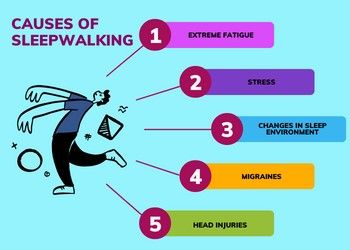General Health
Is it Dangerous to Wake a Sleepwalker?
3 min read
By Apollo 24|7, Published on - 14 November 2022, Updated on - 23 January 2024
Share this article
0
0 like

Do you know of anyone who walks at night and eats or drinks while appearing to be asleep? Okay, so they're literally sleepwalking. And if you're wondering whether or not you should wake them up, the answer is a resounding, "No!"
In this blog, we'll delve deeper into the topic of sleepwalking and discuss the steps you should take if you suspect a loved one of sleepwalking.
What Happens During Sleepwalking?
Sleepwalking, or somnambulism, involves getting up and walking around while in a state of sleep. It manifests itself during the deepest stages of non-rapid eye movement (NREM) sleep.
In the midst of a deep sleep, you may find yourselves sitting up, moving around, and engaging in seemingly conscious actions. Even though it appears that you are awake, you are still very much asleep. The average occurrence time is between the first and second hours of sleep.

Sleepwalking is triggered by arousal, which can be caused by things like environmental stimuli, physiological issues, or just a lack of sleep.
Slow, regular waves or oscillations of brain activity in areas close to the brainstem can be disrupted by some drugs, sudden stimuli, or a lack of sleep. The brain is stimulated just enough to make it possible to move, but not enough to make the person fully awake.
Did You Know? A person who sleepwalks may try to leave the house, urinate in inappropriate locations, cook, eat, drink, or even have intercourse. |
Why Shouldn't You Wake Up A Sleepwalker?
The amygdala, which is involved in emotional reactions like fear and anxiety, may respond with increased activity if the sleepwalker is startled.

A sleepwalker's reaction to being disturbed resembles the "fight or flight" reflex. The person waking them runs the risk of injury from the individual's lashout or a fall. According to professionals, the best course of action is to calmly guide a sleepwalker back to bed and let them resume their sleep.
How to Treat Sleepwalking?
- Make The Environment Safe: Make sure the area is free of any hazards that could cause the sleepwalker to fall and injure oneself. Put a lock on the front door, add a gate at the top of the stairs if there are any, and double-check that the kitchen is secure.
- Lead The Sleepwalker To Bed Gently: Try not to wake up the sleepwalker or scare them by walking them up; instead, try to lead them back to sleep. This protects their mental health and keeps them sleeping uninterrupted.
- Get Adequate Sleep: A lack of sleep, whether from overwork or stress, can cause sleepwalking. It's recommended that you stick to a regular bedtime schedule of 8 hours per night in order to prevent sleep wandering.
Did You Know? Sleepwalking can be a symptom of fatigue! |
- Put Stress In Its Place: Stress impacts your brain and releases cortisol, which can disrupt practically all of your body's activities. This increases your risk of various health issues, including anxiety and depression. Reduce anxiety by meditating, doing yoga, going for a run, or any combination of these. If these suggestions don't help, it's okay to talk to a mental health professional.
- Put Down The Booze: Some research suggests that excessive alcohol use may contribute to these problems as well. Patients taking hypnotic sedatives may also exhibit signs like sleepwalking.
Final Note
There is no such thing as a sleepwalker acting like a zombie, despite what you may have seen in the movies. The sleep disorder known as sleepwalking is more frequent in children and often disappears as their brains mature, but it is more likely to be the result of unresolved stress and poor sleep in adults.
If you still need assistance, feel free to contact our experts today!
Medically Reviewed by Dr. Dhanunjay Reddy B
General Health
Consult Top Sleep Medicine Specialists
View AllLeave Comment
Recommended for you
.jpg?tr=q-80)
General Health
Iron Studies Test: Purpose, Procedure, Range, and Results
Iron Studies Test helps assess iron levels & detect deficiencies. Learn about its purpose, procedure, normal range, and how to interpret test results.

General Health
5 Diseases You Can Get From Your Pet
Pets can be a carrier of several microorganisms such as bacteria, fungi, and viruses. These microbes can transfer from your pet to you and result in infectious diseases called zoonotic diseases.
.jpg?tr=q-80)
General Health
Pus Culture Test: What It Is And How It Helps Diagnose Infections?
Learn about the pus culture test, its purpose, procedure, and how it helps identify bacterial infections for accurate treatment. Find out when you might need one.
Subscribe
Sign up for our free Health Library Daily Newsletter
Get doctor-approved health tips, news, and more.
Visual Stories

Science-backed Home Remedies for Burns and Blisters
Tap to continue exploring
Recommended for you
.jpg?tr=q-80)
General Health
Iron Studies Test: Purpose, Procedure, Range, and Results
Iron Studies Test helps assess iron levels & detect deficiencies. Learn about its purpose, procedure, normal range, and how to interpret test results.

General Health
5 Diseases You Can Get From Your Pet
Pets can be a carrier of several microorganisms such as bacteria, fungi, and viruses. These microbes can transfer from your pet to you and result in infectious diseases called zoonotic diseases.
.jpg?tr=q-80)
General Health
Pus Culture Test: What It Is And How It Helps Diagnose Infections?
Learn about the pus culture test, its purpose, procedure, and how it helps identify bacterial infections for accurate treatment. Find out when you might need one.



